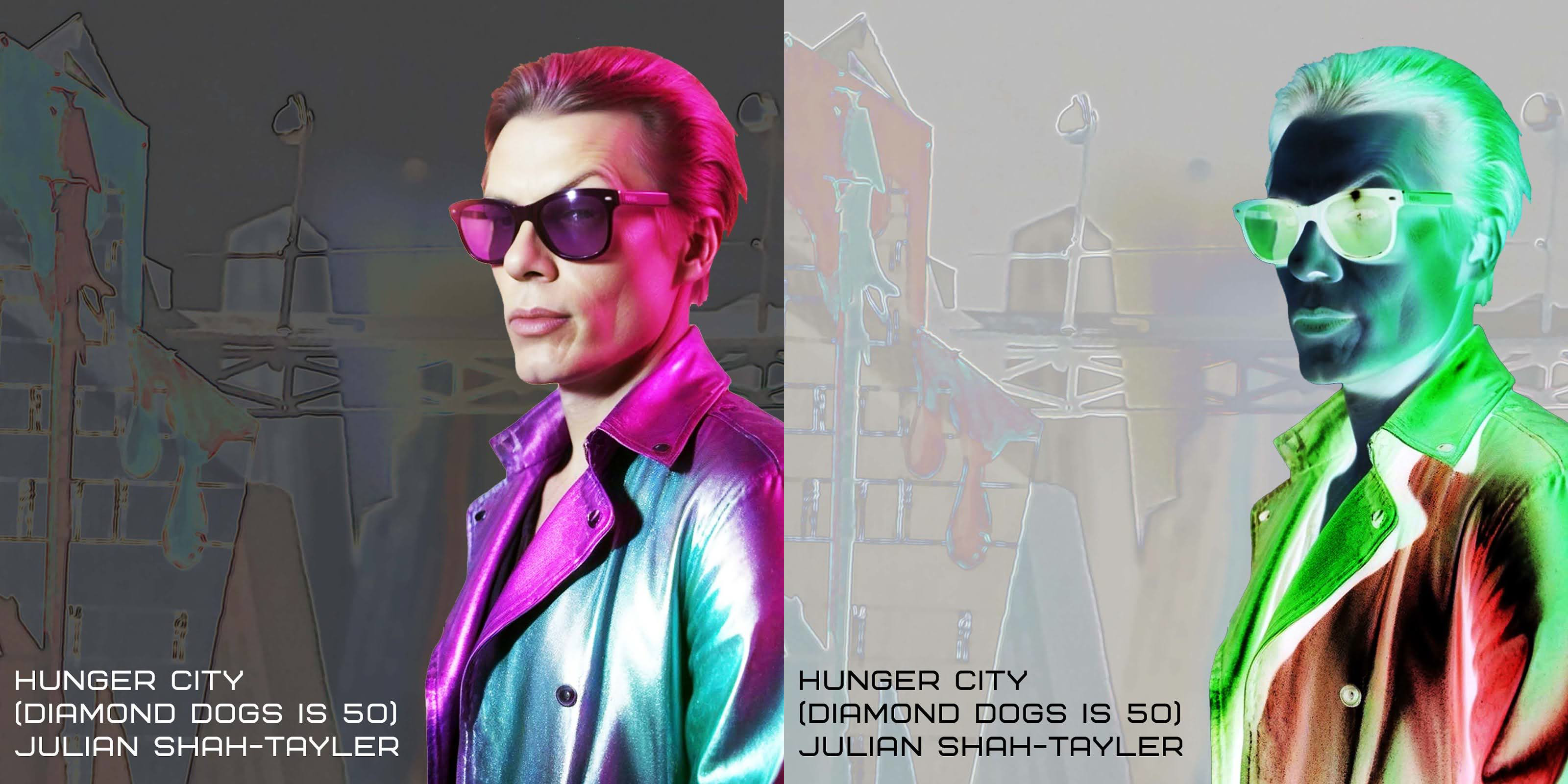By Keith Walsh
David Bowie’s 1974 album Diamond Dogs was the first Bowie LP that singer/songwriter Julian Shah-Tayler owned, and the first one he fell in love with. So for the 50th Anniversary of that post-apocalyptic concept album, Shah-Tayler, as his solo project The Singularity, puts his own unique stamp on a dynamic version featuring his masterful vocals, lots of satisfyingly gritty guitars, and interpretations of work by Bowie’s favorite pianist, Mike Garson. (My new Q and A With Julian Shah-Tayler is at Popular Culture Beat).
As one of a handful of popular Bowie tribute artists in the world, Shah-Tayler has dialed in a captivating interpretation of the rock chameleon’s persona. However, from the opening of his Hunger City: Diamond Dogs Is 50 it’s clear that this is a production once removed from all the madness that Bowie was experiencing in 1974. With sane elegance, Shah-Tayler brings all his studio wizardry, vocal and instrumental skills to the production, starting with a low-key spoken word introduction which becomes a more powerful, pristine version of the title track, “Future Legend/Diamond Dogs.” With Shah-Tayler concealing his synthesizer expertise, this track contains as its basis driving guitar, with acoustic piano in the background.
“On ‘Diamond Dogs.’ he still has the same sophistication and avant-garde approach, but it’s actually serving the song. It’s never actually stepping on the song which he does a lot on ‘Aladdin Sane.'”
Julian Shah-Tayler, On Mike Garson’s Approach To Acoustic Piano
“Sweet Thing/Candidate/Sweet Thing (Reprise)” has acoustic piano as a foundation, along with substantial electronic drums, with Shah-Tayler’s operatically trained voice loaded with emotion that’s somehow purer than Bowie’s was on the original. For Diamond Dogs, Bowie guitarist Mick Ronson stepped aside, so Bowie himself played much of the guitar. Shah-Tayler’s guitar sounds on this album are rich, and his solo on this second track, for example, is weirdly exciting.
By 1974, Bowie was unraveling from the side effects of massive fame and a cocaine addiction. As a touring artist with his Bowie tribute as well as in the role of Alan Wilder for the leading Depeche Mode tribute Strangelove, Shah-Tayler doesn’t allow himself the luxury of rock and roll madness. This professional attitude is on full display on Hunger City: Diamond Dogs Is 50 and when the album’s big single “Rebel Rebel” rolls out, Shah-Tayler finally brings out the synthesizers for the melody hook, along with disco drums and production hellbent on doing something different with the tune. By taking liberties with the arrangement, Shah-Tayler creates something contemporary and far different from the original. (My complete interview with Shah-Tayler about Hunger City: Diamond Dogs Is 50 is at Popular Culture Beat.)
“I’m glad that (Bowie) didn’t get the rights to ‘1984’ because even though that would have been really fascinating, I think his whole career would have taken a different trajectory.”
Julian Shah-Tayler, On David Bowie’s efforts to create a musical play based on George Orwell’s ‘1984.’
“When You Rock And Roll With Me” is another catchy single, and Shah-Tayler glams it up with an exaggerated vocal, big drums and a richly double tracked electric guitar on rhythm. Bowie’s Diamond Dogs was originally conceived as part of a stage show based on George Orwell’s 1984. Unable to receive the rights from Orwell’s estate, Bowie abandoned the project. However, elements of the production remained, and starting with “We Are The Dead,” themes from Orwell’s novel are plainly stated. Shah-Tayler’s voice is powerfully bitter on this elegy to despair. The use by Shah-Tayler of a vintage inspired electronic piano sound is a strong connection to the 1974 original. Shah-Tayler’s fuzzed-out solo electric guitar has a warmly exciting sound as well. His pitch perfect backing vocals are also darkly melancholy. As tune’s motif repeats to the outro, Shah-Tayler’s vocals are wonderfully passionate.
“This is the definitive Bowie goth album, I think. And that’s a lot to do with the murkiness, his production style, it’s lots of stuff.”
Julian Shah-Tayler on Bowie’s ‘Diamond Dogs’
For “1984,” which was a somewhat disco flavored single from the album, Shah-Tayler conjures up a strangely eclectic version with a world beat flavor and a lead guitar taking the place of the string section. For “Big Brother/Chant Of The Ever-Circling Skeletal Family” Shah-Tayler presents a stripped-down version that builds to a dynamic chorus with layered vocals. For only the second or third time in the set, synthesizers appear, which is perhaps an unexpected twist, given Shah Tayler’s prominence in the electronic music scene. A stylistic change and then a repeated phrase ends the album in a similar way that’s more electronic than the 1974 original.
For rock music lovers and Bowie fans especially, Hunger City: Diamond Dogs Is 50 is an exciting new way to experience the classic album. In the past couple years since the waning of the pandemic, Shah-Tayler has performed Bowie classics across the U.S, often accompanying Strangelove. Word on the street is that he’s to have a talk with his The Band That Fell To Earth, about bringing the entire Diamond Dogs album to the stage. Stay tuned.
“Hunger City: Diamond Dogs Is 50” Q & A With Julian Shah-Tayler At PopularCultureBeat.com
Julian Shah-Tayler Dot Com
Julian Shah-Tayler Linktree
Julian Shah-Tayler On Facebook
Julian Shah-Tayler On Instagram
Julian Shah-Tayler On YouTube
Julian Shah-Tayler On TikTok
finis
